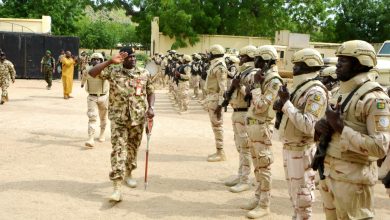Risk of Civil War: Mali in meltdown as militants advance and U.N. withdraws
DAKAR, Oct 3 (Reuters) – Islamist militants in Mali began a blockade of Timbuktu by cutting road access in August and then shut off river and air routes in an offensive that has put the city once again on the frontline of a jihadist insurgency.
The bombing began soon after. On Sept. 21, witnesses said rockets hit a hospital, killing two children, and landed near a school where survivors of a passenger boat attack that killed more than 100 people were sheltering. “Our worry is the shelling,” businessman Sory Touré said in Timbuktu, which was occupied by jihadists a decade ago. “It creates a real psychosis and leaves a lasting impression. I have this fear within me.”Since the United Nations began winding down its peacekeeping mission in July, al Qaeda affiliated militants launched an offensive in central Mali, fighting has resumed between the army and Tuareg rebels from the north and, in the east, Islamic State-allied insurgents have continued to carry out attacks. Mali, run by a junta that has spurned the support of U.N. and French forces, is in meltdown and the violence risks adding to instability across West Africa’s Sahel, a region already reeling from military coups in neighbouring Burkina Faso and Niger.
Experts compare Mali’s situation now to its position in 2012 when another Tuareg rebellion was overtaken by jihadists who captured Timbuktu and pressed south towards the capital Bamako.”This conflict is escalating fast,” said Ulf Laessing, the Bamako-based head of the Sahel programme at the Konrad Adenauer foundation. “There is a risk of civil war.”
Back in 2012, French forces and the U.N. intervened to halt the advance in Mali. But there will be no such intervention now. Mali’s military rulers, who consolidated power over two coups in 2020 and 2021, severed ties with former colonial power France and kicked out its troops. In June, it ordered the 13,000-strong force deployed by the United Nations to leave. Russia’s Wagner Group, which has sent 1,000 mercenaries to support the junta, has failed to fill the gap and is accused of attacks against civilians. More than 650 people have died in conflict in Mali in the two months after the U.N. began pulling out, a more than 40% rise over the previous two months, U.S.-based group Armed Conflict Location & Event Data Project said.
Mali’s authorities did not respond to specific requests for comment for this article. The army said in a statement on Monday that September had been a “turbulent” month but it would continue to fight its enemies to protect the nation and its people.
Source: Edward Mcallister





